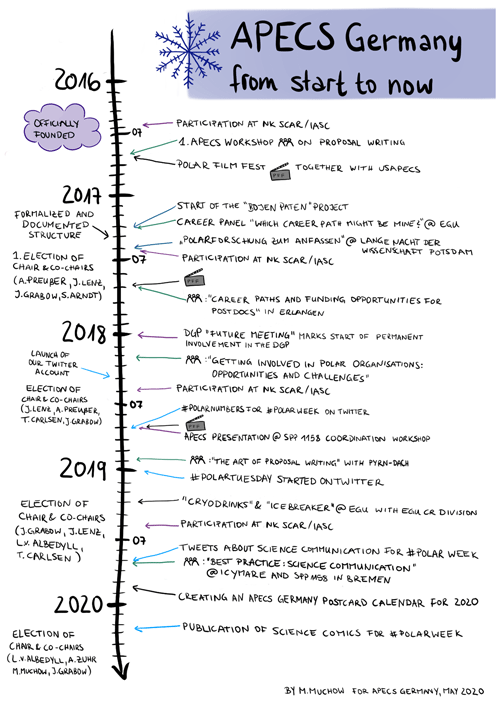The Association of Polar Early Career Scientists (APECS) and APECS Germany: a personal reflection
The Association of Polar Early Career Scientists (APECS) is an international, interdisciplinary organisation for all
early-career researchers, educators, and professionals with interests in
polar and alpine regions. APECS international is governed by an executive
committee and the APECS Council. The German National Committee organises
APECS activities at the national level in Germany and is overseen by a
directing board. We welcome members who have connections to the German
polar, permafrost, alpine, and cryosphere research communities. Following
the relocation of the APECS International Directorate to the Alfred Wegener
Institute (AWI) campus in Potsdam in 2017, the links between APECS
international and APECS Germany have never been stronger. It is with this
momentum that we inaugurate our first column in our new, dedicated
Polarforschung pages. Our first edition will introduce you to two former APECS Germany chairs, who share their perspectives on APECS and their experiences working as polar early-career researchers.
Josefine Lenz, postdoc at the Alfred Wegener Institute Helmholtz Centre for Polar and Marine Research and Project Officer in the APECS International Directorate (since November 2020 APECS Executive Director)
Johanna Grabow, Communications and Information Officer at the Scientific Committee on Antarctic Research (SCAR)
Donovan Dennis, PhD student at German Research Centre for Geosciences (GFZ), interviewer
D. Dennis: To start, tell me about yourself.
J. Lenz: I grew up academically in the AWI permafrost research section. I work on Arctic lakes, namely the past and present thawing of permafrost lakes. For my postdoc I also worked with the University of Alaska Fairbanks and continued working on thermokarst lakes in interior Alaska. For the past two years I've moved into permafrost outreach, working more and more with ECR [early career research] opportunities, particularly in my role organising early-career trainings with the APECS International Directorate.
J. Grabow: I am currently based in Cambridge, England, at the Scientific Committee on Antarctic Research (SCAR). We're based at the Scott Polar Research Institute. I'm the Communications and Information Officer for SCAR, but my background at Cambridge began as a visiting researcher while I did my PhD in Leipzig in Antarctic literature. I spent my PhD reading Antarctic novels, weeding out the good ones. My focus was on contemporary literature. There are some really great ones about modern life at a research station and unusual takes on heroic expeditions.
D. Dennis: What do you think has made APECS Germany so successful?
J. Grabow: We have people with lots of experiences and backgrounds who, through their academic careers, have different connections and networks. I have the feeling that this helped make things successful – and in addition, having a good core [directing] board that keeps the broader group together and pushes the ideas forward.
J. Lenz: I agree. The structure of our monthly meetings and exchanges, with occasional in-person meetups, has worked well. The key people change, of course, but I think if you can keep it as a fun project and enjoy what you're doing and the people around you, that's how it thrives.
J. Grabow: We also ask people what they want to get involved with – ask them what they enjoy doing – and let them do that. And we acknowledge and encourage new ideas.
D. Dennis: Talk to me about challenges facing early-career researchers.
J. Lenz: Looking back, I was actively lacking practical experiences. It is critical to get to know the right people and find a mentor that believes in you and can introduce you to the right people. Thanks to my mentor, I was able to join a research expedition which was not related to my field data, but I got to know new people who brought me to AWI. I think having someone supporting you is key.
D. Dennis: In your opinions, is it a good time to be a German polar early-career researcher?
J. Lenz: Funding might be hard, but it's a good time for young researchers because there are already these professional networks in place. Young researchers are now more involved in important decisions and gain experience early on, and possibilities for training seem to be more numerous right now. Online training, summer schools… maybe it's just my perspective now, but I think they're helpful and increasing.
J. Grabow: I completely agree. Finding a network that supports you is really helpful, and finding mentors that support you. I don't know how it is in different fields, but researchers in the humanities have had to be very creative. We always had to show initiative ourselves – finding funding that fits, applying for grants. There are a lot of opportunities out there that people could use.
D. Dennis: And the next 50 years? Are you nervous?
J. Lenz: I'm a natural scientist, so I'm observing climate change in a little more rational way. I saw rapid changes in the permafrost myself, and I was not only able to see it but also hear it with my ears and feel it with my feet while walking around on freshly drained lake mud. I found myself appreciative that I could see it for myself. But when I think about the next generations, then of course I could get nervous.
J. Grabow: It is frustrating to see how slowly some [policy changes] are moving,
but if you look at how much science has done and developed over the last
50 years – it's incredible to see the progress. I'm excited to see what
will be done in our lifetime. I trust the polar research community and
trust that they will continue working and researching on the topic. I'd like
to stay hopeful.
This oral interview was performed in May 2020. Josefine and Johanna served as APECS Germany Chair in 2018–2019 and 2019–2020, respectively. Figure 1 summarizes leadership changes and activities in APECS Germany from 2016 until early 2020.






